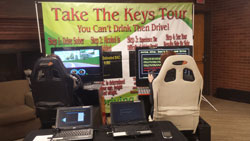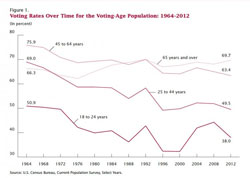The University’s Student Activities Board (SAB) provided driving under the influence (DUI) and texting while driving simulators in the Rebecca Stafford Student Center (RSSC) to raise awareness about the dangers of drinking and/or texting while driving. The simulators allowed students to experience the risks of these occurances while driving through a virtual video game.
“Approximately 2.8 million college students between the ages of 18 and 24 report driving under the influence of alcohol, and over 1,800 die annually from unintentional alcohol-related injuries” according to the Journal of American College Health.
Alicia Torello, a freshman communication major and the Awareness Chair for SAB, explained that the purpose of the event was to give students a “wake up call without anyone getting injured.”
The issue of drinking and/or texting while driving is particularly large among college-aged students. According to the Journal of American College Health, 70 percent of college-enrolled youth report drinking alcohol on a monthly basis and 44 percent report binge drinking, which is defined as the consumption of four or more drinks for women and five or more drinks for men during a single drinking occasion.
Not only has drinking and driving become a major issue among young adults, but texting while driving, which can cause similar affects, is becoming an issue as well. A national survey from Libery Mutual and Students Against Drunk Driving reported that, “A depressing 78 percent of teenagers reported texting while driving themselves: 27 percent often or very often, 24 percent sometimes, 28 percent at least rarely.”
“If we can change one person’s mind, we accomplished something,” Torello added.
Steve Schukin, a senior accounting major, believes students use their phones so often that they do not see texting while driving as an problem.
“Most kids our age are taught throughout life that drinking and driving is dangerous and that they should call a cab or have a [Designated Driver],” said Schukin. “But to some, texting and driving just doesn’t seem to be as big of a risk as drinking and driving because the penalty is not as harsh.”
The problem that students must realize is that texting while driving can be just as dangerous as drinking while driving, Schukin added.
Fiona Lynch, the Rutgers University head fencing coach, shared her philosophy on drinking and driving during the presentation in the RSSC.
“I know what it’s like to be in college, I just was. I also know what it’s like to have a few beers, feel invincible, and have a car,” Lynch said. “The point I drive home with my fencers is that they have a name to uphold if they do something stupid. They’re responsible for themselves, not just others.”
Sometimes, the explanations for young adults’ actions can reflect back to their parents’ actions. A survey completed by Liberty Mutual and Students Against Drunk Driving found teenagers blaming parents for “do as I say, not as I do” hypocrisy. The study found that 59 percent of teenagers reported seeing their parents text and drive.
“But regardless, when you’re driving you’re responsible for every beating heart in the car. There’s a reason why a driver’s license is a responsibility, not a privilege,” Lynch added.
“By 1988, all states in the United States had raised their legal drinking age from 18 to 21 and an analysis of 57 published studies on the effects of this change conducted that higher legal drinking ages reduced alcohol-related vehicle crashes,” according to a study in the US National Library of Medicine National Institutes of Health.
However, this does not change the fact that when young adults drink too much, decision-making is not the same as if they are sober.
Torello originally hoped to attract up to 150 people to the event, although she said she was happy if the event impacted even a few people.
In addition to raising awareness about drinking or texting while driving, the issue hit home with a few students. Michael Lubischer, a senior accounting major, said. “I know someone who hit someone drunk driving and the person who was hit was paralyzed and the driver went to jail for a few years.”
Torello faced the issue in her own life. “I have a family friend who was speeding and texting and is now paralyzed and slightly mentally disabled because of the accident,” she said. “I have not text and drove, or drank and drove. I’m too nervous to.”
PHOTO COURTESY of Ashley Brousell



